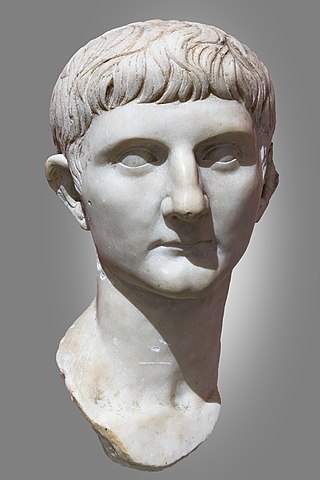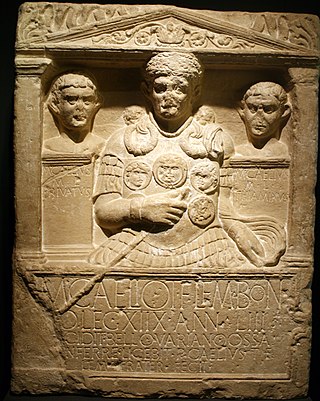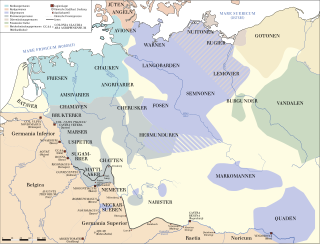
Germanicus Julius Caesar was an ancient Roman general, known for his campaigns in Germania. The son of Nero Claudius Drusus and Antonia the Younger, Germanicus was born into an influential branch of the patrician gens Claudia. The agnomen Germanicus was added to his full name in 9 BC when it was posthumously awarded to his father in honour of his victories in Germania. In AD 4, he was adopted by his paternal uncle Tiberius, who succeeded Augustus as Roman emperor a decade later. As a result, Germanicus became an official member of the gens Julia, another prominent family, to which he was related on his mother's side. His connection to the Julii was further consolidated through a marriage between himself and Agrippina the Elder, a granddaughter of Augustus. He was also the father of Caligula, the maternal grandfather of Nero, and the older brother of Claudius.
Maroboduus was a king of the Marcomanni, who were a Germanic Suebian people. He spent part of his youth in Rome, and returning, found his people under pressure from invasions by the Roman empire between the Rhine and Elbe. He led them into the forests of Bohemia, near to the Quadi who already lived nearby, and established a large alliance.

The Battle of the Teutoburg Forest, described as the Varian Disaster by Roman historians, took place at modern Kalkriese in AD 9, when an alliance of Germanic peoples ambushed Roman legions and their auxiliaries, led by Publius Quinctilius Varus. The alliance was led by Arminius, a Germanic officer of Varus's auxilia. Arminius had acquired Roman citizenship and had received a Roman military education, which enabled him to deceive the Roman commander methodically and anticipate the Roman army's tactical responses.

Arminius was a chieftain of the Germanic Cherusci tribe who is best known for commanding an alliance of Germanic tribes at the Battle of the Teutoburg Forest in 9 AD, in which three Roman legions under the command of general Publius Quinctilius Varus were destroyed. His victory at Teutoburg Forest would precipitate the Roman Empire's permanent strategic withdrawal from Germania Magna. Modern historians have regarded Arminius' victory as one of Rome's greatest defeats. As it prevented the Romanization of Germanic peoples east of the Rhine, it has also been considered one of the most decisive battles in history and a turning point in human history.

The Chauci were an ancient Germanic tribe living in the low-lying region between the Rivers Ems and Elbe, on both sides of the Weser and ranging as far inland as the upper Weser. Along the coast they lived on artificial mounds called terpen, built high enough to remain dry during the highest tide. A dense population of Chauci lived further inland, and they are presumed to have lived in a manner similar to the lives of the other Germanic peoples of the region.

The Cherusci were a Germanic tribe that inhabited parts of the plains and forests of northwestern Germany in the area of the Weser River and present-day Hanover during the first centuries BC and AD. Roman sources reported they considered themselves kin with other Irmino tribes and claimed common descent from an ancestor called Mannus. During the early Roman Empire under Augustus, the Cherusci first served as allies of Rome and sent sons of their chieftains to receive Roman education and serve in the Roman army as auxiliaries. The Cherusci leader Arminius led a confederation of tribes in the ambush that destroyed three Roman legions in the Teutoburg Forest in AD 9. He was subsequently kept from further damaging Rome by disputes with the Marcomanni and reprisal attacks led by Germanicus. After rebel Cherusci killed Arminius in AD 21, infighting among the royal family led to the highly Romanized line of his brother Flavus coming to power. Following their defeat by the Chatti around AD 88, the Cherusci do not appear in further accounts of the German tribes, apparently being absorbed into the late classical groups such as the Saxons, Thuringians, Franks, Bavarians, and Allemanni.

Publius Quinctilius Varus was a Roman general and politician under the first Roman emperor Augustus. Varus is generally remembered for having lost three Roman legions when ambushed by Germanic tribes led by Arminius in the Battle of the Teutoburg Forest, whereupon he took his own life.

Legio XIX was a legion of the Imperial Roman army. It was destroyed in 9 AD in the Battle of the Teutoburg Forest. The emblem of the XIXth legion is unknown but was probably the Capricorn like other legions levied by Augustus.

Legio XVII was a legion of the Imperial Roman army. It was founded by Augustus around 41 BC. The legion was destroyed in the Battle of the Teutoburg Forest. The legion's symbol and cognomen are unknown.

The Battle of the Weser River, sometimes known as the First Battle of Minden or Battle of Idistaviso, was fought in 16 AD between Roman legions commanded by Roman Emperor Tiberius's heir and adopted son, Germanicus, and an alliance of Germanic peoples, commanded by Arminius. The battle marked the end of a three-year series of campaigns by Germanicus in Germania.
Segestes was a nobleman of the Germanic tribe of the Cherusci involved in the events surrounding the Roman attempts to conquer northern Germany during the reign of Roman Emperor Augustus.

Thusnelda was a Germanic Cheruscan noblewoman who was captured by the Roman general Germanicus during his invasion of Germania. She was the wife of Arminius. Tacitus and Strabo cite her capture as evidence of both the firmness and restraint of Roman arms.

The Angrivarii were a Germanic people of the early Roman Empire, who lived in what is now northwest Germany near the middle of the Weser river. They were mentioned by the Roman authors Tacitus and Ptolemy.

Germania was a short-lived Roman province for the duration of 16 years under Augustus, from 7 BC to AD 9. The possible capital of this province was Marktbreit, a castrum with a nearby canaba from the period of Emperor Augustus, located 70 km east of the "Limes Germanicus" on the River Main.
Aulus Caecina Severus was a Roman politician and general who was consul in 1 BC. He was Emperor Augustus' representative in Moesia when the Great Illyrian Revolt broke out. As a result, he spent 4 years in heavy fighting against the Illyrian tribes before the revolt was suppressed by the Romans. In 14 AD he was in charge of several legions on the lower Rhine which mutinied on the death of Augustus. He was recorded as having handled this poorly, with the situation only being salvaged by the intervention of his commander-in-chief, Germanicus.
Arminius is an oratorio by the German composer Max Bruch. Bruch wrote the work between 1875 and 1877 during the consolidation of the newly founded German Empire. He picked the story revolving around Arminius and the Cherusci-led defeat of three Roman legions in the Teutoburg Forest in 9 A.D., which served as a German national myth from the 16th to the early 20th century.

The Roman campaigns in Germania were a series of conflicts between the Germanic tribes and the Roman Empire. Tensions between the Germanic tribes and the Romans began as early as 17/16 BC with the Clades Lolliana, where the 5th Legion under Marcus Lollius was defeated by the tribes Sicambri, Usipetes, and Tencteri. Roman Emperor Augustus responded by rapidly developing military infrastructure across Gaul. His general, Nero Claudius Drusus, began building forts along the Rhine in 13 BC and launched a retaliatory campaign across the Rhine in 12 BC.

The Battle at Pontes Longi was fought near Bramsche, Germany in 15 AD between the Roman general Aulus Caecina Severus and an alliance of Germanic peoples commanded by Arminius. It was part of a three-year series of campaigns by Germanicus in Germania. The battle was inconclusive.
The Battle of the Angrivarian Wall was fought near Porta Westfalica, Germany in 16 AD between the Roman general Germanicus and an alliance of Germanic tribes commanded by Arminius. This battle followed immediately after the Battle of Idistaviso, and was supposedly sparked by Germanic outrage over the trophy erected on that prior battlefield by the Romans.

Barbarians is a 2020 German historical war drama television series created by Andreas Heckmann, Arne Nolting, and Jan Martin Scharf. It stars Laurence Rupp, Jeanne Goursaud, and David Schütter. The series is a fictional account of events during the Roman Empire's occupation of Germania, and the resulting rebellion of the Germanic tribes led by Arminius. The series was renewed for season 2 on November 10, 2020. It was released on Netflix on October 21, 2022.














